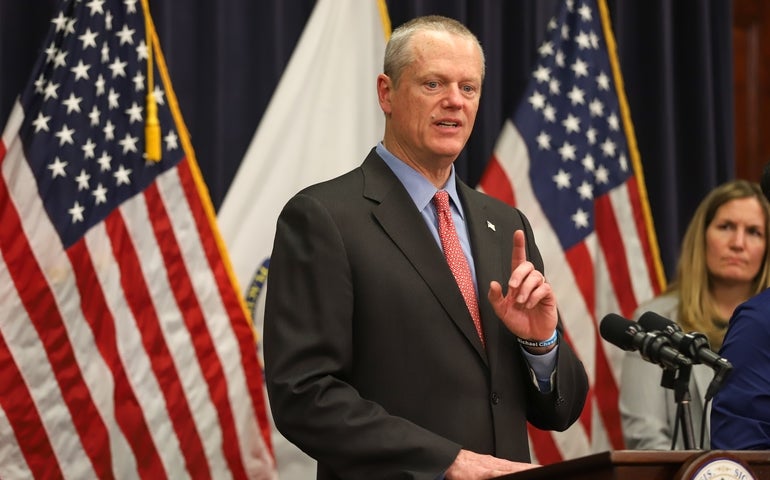Massachusetts officials will launch a large-scale contact tracing program with the help of a nonprofit health organization, aiming by the end of April to have about 1,000 people investigating and recording every instance of potential coronavirus transmission at a time when cases across the state are expected to soar into the tens of thousands.
Public health experts at the state and local level are already working to track who might have been exposed to patients with COVID-19, but doing so with current resources is growing more difficult as new cases grow daily at an accelerating rate.
The new Community Tracing Collaborative developed with the group Partners in Health will provide a “much more robust, targeted approach” to bend the curve downward and limit new cases of the highly infectious disease, Gov. Charlie Baker said as he announced the effort Friday.
“What we’re doing here today is the beginning of a breaking of new ground in the fight against COVID-19,” Baker said during a Friday press conference. “Massachusetts will be the only state in the country putting together this kind of programming. There’s no nationwide tracking that’s currently being done, and we anticipate that we need to get out ahead of this and do everything we possibly can here in Massachusetts to deal with COVID-19 through and in the aftermath of the surge.”
Staff at a call center will reach out to as many coronavirus patients in Massachusetts as possible, both to connect them with health resources and to acquire contact information for everyone with whom patients recently interacted.
The team of close to 1,000 tracers will then attempt to reach to patients’ contacts to inform them of the possible exposure and offer isolation resources, which public health officials say can help limit further spread.
Dr. Joia Mukherjee, PIH’s chief medical officer, said knowledge about who those infected may have contacted is crucial to slowing the spread of the highly infectious disease.
“Social distancing measures that the governor has led are an important first step in slowing transmission, but without knowing our own status, without being able to specifically protect our loved ones, we are all living in the dark,” she said. “We know that there is significant anxiety in this darkness. Many people say, ‘Well, we’re staying at home anyway, so what’s the difference?’ It is an enormous difference if you know that you have been in contact with someone who has COVID-19.”
Partners in Health, which has experience responding to the 2014 to 2016 Ebola outbreak in west Africa and the 2010 cholera outbreak in Haiti, will provide staff and expertise for the collaborative. It will also be responsible for hiring the team of tracers across the state, many of whom are already on board.
Accenture and Salesforce, both private companies, will also contribute logistical and technical support to the effort, while the center will be led by the Baker administration’s coronavirus command center that Health and Human Services Secretary Marylou Sudders is running.
Researchers say that strong contact tracing practices cannot fully prevent the spread of infectious diseases, but it can decrease the amount of time between someone becoming infected and isolating themselves and therefore can lessen transmission risks.
Dr. Paul Farmer, one of PIH’s founders, referred to the organization’s experience fighting Ebola as a foil for the state’s urgent response.
“There, the steps that Gov. Baker and his administration are proposing were not taken in time. There were not the resources necessary to flatten any curves, and so in at least three countries, the health care delivery system was flattened itself. This is one of the things we wish to avoid here,” Farmer said. “We’ve seen what it’s like when it happens, and this time around, we’re going to see what it’s like when the full monty is applied.”
Hours after the announcement, Massachusetts public health officials announced 1,436 new cases to bring the statewide total to 10,402. The past 24 hours were also the deadliest yet for the disease, with 38 new deaths reported and a cumulative death toll of 192.
The rapid growth in confirmed cases over the past two weeks is due partially to increased testing capacity. With about 20 outside facilities supplementing the state public health laboratory, Massachusetts is now testing close to 5,000 patients per day.
By the time the tracing collaborative is fully operational, the state could already be in the midst of peak hospitalizations that Baker on Thursday said may hit between April 10 and April 20.
Both the governor and Mukherjee forcefully argued that late April will not be too late to expand tracing efforts.
“It will be hard, and we are daunted by the challenge, but we are undaunted by the moral need to stop the epidemic,” Mukherjee said. “So is it too late? It cannot be too late. We need to mitigate the suffering, now.”
Repeating model estimates the administration unveiled Thursday, Baker said between 47,000 and 172,000 Massachusetts residents may become infected with COVID-19 over the course of the outbreak.
Hospitals and public safety officials are preparing for “what will be a difficult time over the next three to four weeks,” he said.
“Our models suggest cases are likely to increase rapidly in the coming weeks, and the strain on our health care system will be unprecedented,” Baker said. “But we’re also focused on the long game for how we can monitor, isolate and put our communities in a position to mitigate the number of new COVID-19 cases over time, and that’s where this tracing initiative comes in.”

